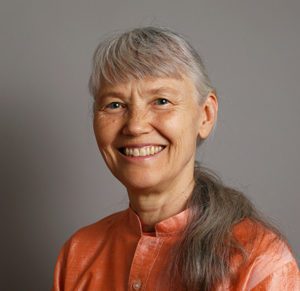 Yoga understands the brilliant function of pain. One difference between Yoga and Western medicine is the perspective on pain and suffering. In the hospital, pain is the adversary, and the treatments are there to “kill” it. They often prescribe “pain killers” especially when they don’t know what else to do. In the classical Yoga model of illness, pain is there to help us. Swami Satchidananda often said, “Physical pain is a messenger. It is not there to kill you and you don’t have to kill the pain. It’s a messenger that tells you there is something wrong somewhere, so you know change is needed.” It is also true that without emotional pain we may never open our eyes and realize the shallowness of the temporary happiness we’re running after. Pain becomes stronger or milder according to how one faces it.
Yoga understands the brilliant function of pain. One difference between Yoga and Western medicine is the perspective on pain and suffering. In the hospital, pain is the adversary, and the treatments are there to “kill” it. They often prescribe “pain killers” especially when they don’t know what else to do. In the classical Yoga model of illness, pain is there to help us. Swami Satchidananda often said, “Physical pain is a messenger. It is not there to kill you and you don’t have to kill the pain. It’s a messenger that tells you there is something wrong somewhere, so you know change is needed.” It is also true that without emotional pain we may never open our eyes and realize the shallowness of the temporary happiness we’re running after. Pain becomes stronger or milder according to how one faces it.
If we heed the message it sends, it will help direct us to skillful techniques to reduce the symptoms, like Yoga poses, breathwork, and relaxation. It can also show us where we need to change our lifestyle to support good health. And pain directs us to seek the root cause on progressively deeper levels. Yoga teaches us to understand the causes of suffering on every level: physical, energetic, emotional, and intellectual. And through the eight limbs of classical Yoga, we can help create wellness on every level. That’s the approach of Integral Yoga Therapy.
When I served as a hospital chaplain, I was inspired by the diagnostic capacity of Western medicine. I saw the life-saving power of surgery, and the deep dedication and compassion of the doctors, nurses, and staff. There is much to appreciate and respect in that tradition. I also saw how Yoga can be integrated into the Western medical system, and how the perspective of Yoga can sometimes help relieve suffering at the level of the cause, rather than just treat the symptoms.
The Yoga therapist relies on Western medicine to do its excellent diagnostic work. When someone has a diagnosis, Integral Yoga has trainings that specialize in Yoga for many chronic illnesses, like cancer and heart disease. As a complement, the Yoga therapist has special training to help guide a person to understand their pain and use it to guide the Yoga intervention. Yoga Therapy usually begins with the body, because it’s the easiest place to intervene. Then one can progressively work on the other levels. Recent clinical research shows that this approach—combining asana, relaxation, breathwork, and meditation and mindfulness—is a potent form of natural intervention with wide-ranging benefits.
Yoga Therapy seeks to relive suffering. But its secret tool is it knows how to use the energy of suffering as an ally in the therapeutic process.
About the Author:

Swami Vidyananda has enjoyed many different roles in her life, including radio news reporter, translator for Swami Satchidananda, and video producer. She is a senior monk who has received training as a hospital chaplain. She has been teaching Integral Yoga since 1972. She is a versatile teacher, who helped develop the Integral Yoga Stress Management Teacher Training program. She specializes in workshops on stress management as well as Yoga and the emotions. Swami Vidyananda has taught in the US, Canada, Europe, India, and Australia. For more information, please visit: www.swamividyananda.com.

